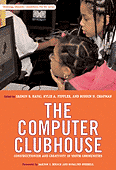The Computer ClubhouseConstructionism and Creativity in Youth Communities
|

|
 Diese Seite wurde seit 1 Jahr inhaltlich nicht mehr aktualisiert.
Unter Umständen ist sie nicht mehr aktuell.
Diese Seite wurde seit 1 Jahr inhaltlich nicht mehr aktualisiert.
Unter Umständen ist sie nicht mehr aktuell.
 Zusammenfassungen
Zusammenfassungen
 This book is about the Computer Clubhouse—the idea and the place—that inspires youth to think about themselves as competent, creative, and critical learners. So much of the social life of young people has moved online and participation in the digital public has become an essential part of youth identities. The Computer Clubhouse makes an important contribution not just in local urban communities but also as a model for after-school learning environments globally. The model has been uniquely successful scaling up, with over 100 clubhouses thriving worldwide. Showcasing research by scholars and evaluators that have documented and analyzed the international Computer Clubhouse Network, this volume considers the implications of their findings in the context of what it means to prepare youth to meet the goals of the 21st Century.
This book is about the Computer Clubhouse—the idea and the place—that inspires youth to think about themselves as competent, creative, and critical learners. So much of the social life of young people has moved online and participation in the digital public has become an essential part of youth identities. The Computer Clubhouse makes an important contribution not just in local urban communities but also as a model for after-school learning environments globally. The model has been uniquely successful scaling up, with over 100 clubhouses thriving worldwide. Showcasing research by scholars and evaluators that have documented and analyzed the international Computer Clubhouse Network, this volume considers the implications of their findings in the context of what it means to prepare youth to meet the goals of the 21st Century. Dieses Buch erwähnt ...
Dieses Buch erwähnt ...
 Begriffe KB IB clear |  Computer Computer computer
, computer
,  Digitalisierung
, Konstruktionismusconstructionism
, Digitalisierung
, Konstruktionismusconstructionism
,  Kreativität Kreativität creativity
, creativity
,  Lernen Lernen learning
, learning
,  Schule Schule school school
|
 Dieses Buch erwähnt vermutlich nicht ...
Dieses Buch erwähnt vermutlich nicht ... 
 Nicht erwähnte Begriffe | Bildung, Internet, Kinder, LehrerIn, Unterricht |
 Tagcloud
Tagcloud
 Zitationsgraph
Zitationsgraph
 Zitationsgraph (Beta-Test mit vis.js)
Zitationsgraph (Beta-Test mit vis.js)
 9 Erwähnungen
9 Erwähnungen 
- Programming Multimedia Stories in Scratch to Integrate Computational Thinking and Writing with Elementary Students (Shaunna Smith, Lauren E. Burrow)


- Internet für Psychologen (Bernad Batinic) (1997)

- New Technology and Digital Worlds - Analyzing Evidence of Equity in Access, Use, and Outcomes (2010)


- SIGCSE 2013 - The 44th ACM Technical Symposium on Computer Science Education, SIGCSE '13, Denver, CO, USA, March 6-9, 2013 (Tracy Camp, Paul T. Tymann, J. D. Dougherty, Kris Nagel) (2013)
- The social turn in K-12 programming - Moving from computational thinking to computational participation (Yasmin B. Kafai, Leo Leppänen, Quinn Burke, Juho Leinonen, Arto Hellas) (2013)
- Connected Code - Why Children Need to Learn Programming (Yasmin B. Kafai, Quinn Burke) (2014)


- Modality matters - Understanding the Effects of Programming Language Representation in High School Computer Science Classrooms (David Weintrop) (2016)


- Emerging Research, Practice, and Policy on Computational Thinking (Peter J. Rich, Charles B. Hodges) (2017)


- 24. Computational Participation - Teaching Kids to Create and Connect Through Code (Yasmin B. Kafai, Quinn Burke) (2017)


- 24. Computational Participation - Teaching Kids to Create and Connect Through Code (Yasmin B. Kafai, Quinn Burke) (2017)
- Lifelong Kindergarten - Cultivating Creativity through Projects, Passion, Peers, and Play (Mitchel Resnick) (2017)


- ICER 2020 - International Computing Education Research Conference, Virtual Event, New Zealand, August 10-12, 2020 (Anthony V. Robins, Adon Moskal, Amy J. Ko, Renée McCauley) (2020)
- An Analysis of Use-Modify-Create Pedagogical Approach's Success in Balancing Structure and Student Agency (Diana Franklin, Merijke Coenraad, Jennifer Palmer, Donna Eatinger, Anna Zipp, Marco Anaya, Max White, Hoang Pham, Ozan Gökdemir, David Weintrop) (2020)


- An Analysis of Use-Modify-Create Pedagogical Approach's Success in Balancing Structure and Student Agency (Diana Franklin, Merijke Coenraad, Jennifer Palmer, Donna Eatinger, Anna Zipp, Marco Anaya, Max White, Hoang Pham, Ozan Gökdemir, David Weintrop) (2020)
 Co-zitierte Bücher
Co-zitierte Bücher

Interdisciplinary Constructions for Learning and Knowing Mathematics in a Computer-Rich School
(Idit Harel) (1991)



Confronting the Challenges of Participatory Culture
Media Education for the 21st Century
(Henry Jenkins, Katie Clinton, Ravi Purushotma, Alice J. Robison, Margaret Weigel) (2006)



Living and Learning with New Media
Summary of Findings from the Digital Youth Project
(Mizuko Ito, Heather Horst, Matteo Bittanti, danah boyd, Becky Herr-Stephenson, Patricia G. Lange, C.J. Pascoe, Laura Robinson) (2008)


Women and Information Technology
Research on Underrepresentation
(J. McGrath Cohoon, William Aspray) (2006)
 Bibliographisches
Bibliographisches 
 Beat und dieses Buch
Beat und dieses Buch
Beat hat dieses Buch während seiner Zeit am Institut für Medien und Schule (IMS) ins Biblionetz aufgenommen. Beat besitzt weder ein physisches noch ein digitales Exemplar. Aufgrund der wenigen Einträge im Biblionetz scheint er es nicht wirklich gelesen zu haben. Es gibt bisher auch nur wenige Objekte im Biblionetz, die dieses Werk zitieren.


















 Biblionetz-History
Biblionetz-History